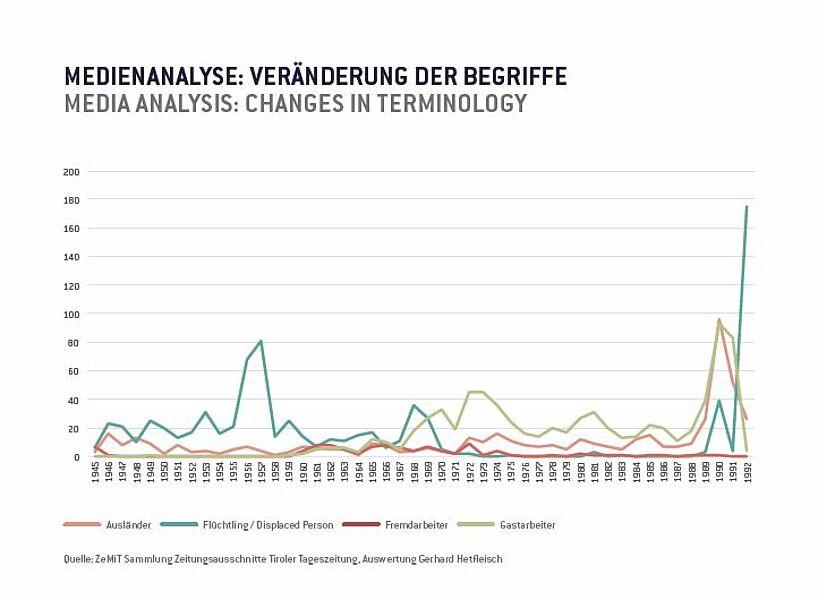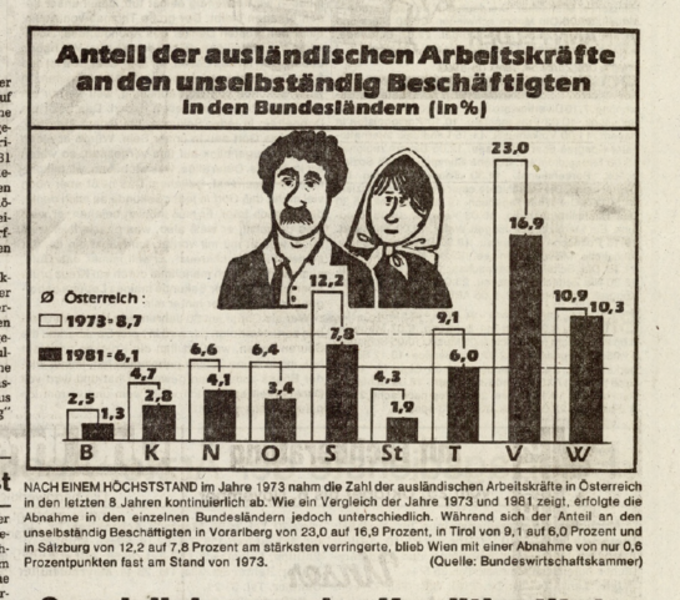
STIGMA MIGRATION
Words shape our perceptions, as an analysis of articles published in the “Tiroler Tageszeitung” shows: The term “Fremdarbeiter” (foreign worker), with its negative connotations in the context of National Socialism, was in general use until 1945/46 and then not until 1960 to the beginning of the 1970s. After that it was used only infrequently. After 1945 the neutral word “Ausländer” (foreigner) became the usual expression, especially from the end of the 1980s onwards. From the end of the 1960s to the beginning of the 1990s, “Gastarbeiter” (guest worker) was also a standard and very frequent expression. In addition to “foreigners”, the term “migrants” has been in use since the mid-1990s.
Foreign
During the Nazi period, the term foreign worker (Fremdarbeiter/Fremdarbeiterin) was used for foreigners deported to Germany as slave labourers. In Austria, it remained in common use after the War until the beginning of the 1970s.
Guest worker
Workers recruited from abroad in the 1960s and 70s were called guest workers (Gastarbeiter/Gastarbeiterin). The expression is a euphemism; the migrants were never treated as guests. The term lost its relevance in the 1990s.
Foreigner
Foreigner (Ausländer/Ausländerin) is considered the most neutral term for someone who does not hold citizenship of the host country. The meaning of the word is so wide-ranging as to be problematical: It can be applied to both tourists and immigrants, EU citizens and third-country nationals, and refugees and economic migrants.
Alien
Under Austrian law, aliens (Fremde) are people who do not hold Austrian citizenship. In everyday usage, the German word is also synonymous with "unknown", "unfamiliar" or even "alarming". The connotations of the word are correspondingly negative.
Migration/Migrant
These words also have a wide range of meaning; they cover workers recruited from abroad, voluntary mobility, refugees and both internal migration (within a country) and international (cross-border) migration.
Transmigration
Transmigrants live in multiple worlds. In the normal case their lives and activities relate to their societies of origin and residence and are embedded in a social field that is stabilised through a complex pattern of family, economic, social, institutional, religious and political networks. Transmigrants have variable and diverse affiliations.
International migration
The UN defines international migration as the voluntary relocation of people from one country, of which they are nationals, to another country on a temporary or permanent basis. The definition excludes refugees, displaced persons and others who are forced to leave their homes. International migrants do not enjoy the same rights as recognised refugees or people granted citizenship of the host country.
People with a migrant background
Unlike the Federal Statistical Office of Germany, Statistics Austria classifies the children of immigrants whose parents were both born abroad as "people with a migrant background". That raises the question, not only in statistical terms, whether it makes sense to capture the historical migration context over several generations or even to do so at all: If naturalisation is not merely a step but the final point in the integration process, all analysis of migration background and hence the term itself must be considered obsolete.


